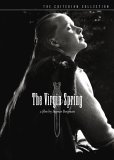| Reviews & Columns |
|
Reviews DVD TV on DVD Blu-ray 4K UHD International DVDs In Theaters Reviews by Studio Video Games Features Collector Series DVDs Easter Egg Database Interviews DVD Talk Radio Feature Articles Columns Anime Talk DVD Savant Horror DVDs The M.O.D. Squad Art House HD Talk Silent DVD
|
DVD Talk Forum |
|
|
| Resources |
|
DVD Price Search Customer Service #'s RCE Info Links |
|
Columns
|
|
|
Virgin Spring - Criterion Collection
Widely regarded as the loose inspiration for Wes Craven's angry masterpiece of exploitation, Last House On The Left, Ingmar Bergman's The Virgin Spring is obviously a lot less trashy but the film still manages to pack a punch and deliver some powerful visuals. This tense and suspenseful story would be the movie that would win Bergman his first Academy Award in 1961 for Best Foreign Language Film.
Based on an old Medieval Swedish balled (which Criterion has seen fit to reprint in the booklet that accompanies this fine DVD, more on that in the Extras section), the story is set in the fourteenth century and follows Karin (Birgitta Pettersson) and her pregnant half-sister as they journey from the safe confines of their simple home through the woods to deliver some candles to their church. Along the way, Ingeri (Gunnel Lindblom), the half sister, becomes nervous and so Karin decides that she should stay with a man that they meet along the way. Unfortunately, Ingeri gets even more frightened by the man who demonstrates some old pagan rituals to her, and she runs off after Karin.
She arrives in time to see the poor naïve girl being brutally raped by two men (and a boy who looks on as it all occurs) but does nothing to stop the proceedings as she wants Karin to feel the same pain that she felt when it happened to her (which resulted in her pregnancy). The three woodsmen eventually kill Karin and steal her fine clothes, leaving her corpse in the woods to rot in only her undergarments.
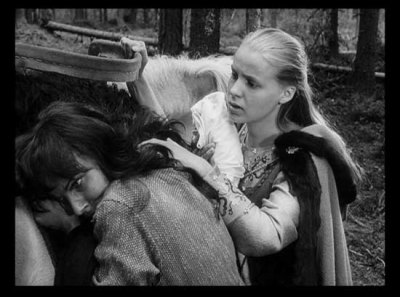
Ingeri runs off into the woods and the men disappear, only to turn up at the girls' home, asking their father, Tore (the always fantastic Max Von Sydow of The Exorcist and more recently Dario Argento's Sleepless), for food and shelter for the night. He lets them into the servants' quarters for the night and feeds them. When he and his wife go to bed, she is awoken when she hears the boy yell. When she goes downstairs she finds him passed out, but the ringleader of the group is awake and he tries to pass on what he claims is the elaborate garment of his deceased sister to her to buy, as they claim to desperately need the money. She takes it upstairs to show her husband, and the two of them confirm it to belong to their daughter, Karin, who has not yet arrived home.
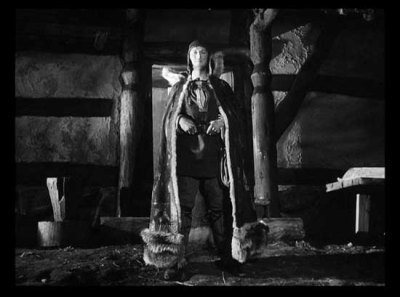
SPOILERS BELOW:
When Ingeri returns home and confirms to Tore that she did indeed witness the very men staying in their home raping and murdering her half sister, Tore cares not that she admits to having wanted it to happen. Instead, he becomes enraged and proceeds to brutally murder not only the two men but also the boy who accompanied them as well in one of the most intense scenes ever committed to celluloid.
END OF SPOILERS.
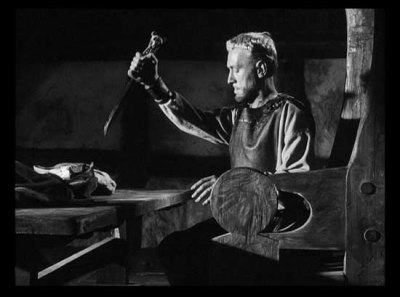
The Virgin Spring is an intense and disturbing movie that has all of the impact of Craven's remake with a lot less of the sleaze. Beautifully shot in stark black and white, The Virgin Spring contains some truly stand out performances, particularly from Von Sydow who is quite intimidating in the final moments of the film when his rage becomes all encompassing. Birgitta Pettersson as the beautiful but naïve Karin, who ultimately pays the final price for being far too trusting of strangers, is also very good, bringing just enough snobbish class to her role for it to work.
While the final scene of the film does feel unnecessary as it brings to the forefront Bergman's preoccupation with the human compulsion to believe in a God, it does raise some interesting themes despite itself and doesn't even come close to ruining the film. The movie also makes some interesting contrasts to the pagan rituals of Sweden's history to the Christian theology that, at the time that the film was set, happened to be sweeping the nation. Pay close attention and you'll notice that Bergman is showing us all manner of Norse pagan symbolism throughout the movie and seems to be comparing it to the Christian faith that Karin and her family have acknowledged and adopted as her own.
The DVD Video:
Criterion has done a very nice job of cleaning up their 1.33.1 fullframe transfer, which presents the film in its original aspect ratio. The black and white image is exceptionally strong and there is a pleasing level of depth to picture. Overall image quality is quite solid - contrast levels are well balanced and the black levels stay pretty strong throughout. There is some moderate grain and some noticeable print damage present on the image but it isn't anything to complain too heavily about. Overall there's a pretty revealing level of clarity to the transfer and the image handles not only the stark blacks and whites but also the intermediate grays very nicely as well. This DVD does justice to the beautiful cinematography and considering how important the visuals and compositions are to the film's narrative, that's a very good thing indeed. While the Tartan DVD that came out for the British market a couple of years ago looked nice, this new disc from Criterion is a noticeable improvement - The Virgin Spring looks excellent here.
The film is presented in its native Swedish language in a pretty decent sounding Dolby Digital Mono mix which includes optional English language subtitles that are free of any typographical errors and are clean, clear and easy to read. The audio mix for the film is quite basic; there are a few scenes with little or no dialogue and during these moments the film makes use of ambient and background noise, which this mix reproduces very nicely. Criterion has obviously gone to some effort to clean the mix up as while there is some audible hiss in one or two spots, it's only very minor and there aren't any problems with distortion during playback. The dialogue is pretty distinctive sounding and it's certainly easy enough to follow even if it doesn't have much range. In short, there's really nothing worth complaining about here and what little musical score is used in the film sounds particularly good. An English dub option is also supplied as a secondary audio option on this DVD. Criterion has once again compiled a very nice selection of extra features for this DVD. First up is a video introduction from director Ang Lee that was recorded in October of 2005. He talks about how he saw the movie at eighteen years old and how it had a huge impact on him. Lee does a very good job of explaining what aspects of the movie really work for him and how impressed he was with specific portions of the film. He also adds some critical insight into the movie and gives us his interpretation of a few different sequences. This introduction is just over seven minutes in length. Up next is a feature length commentary from noted Bergman scholar, Birgitta Steene, a professor of Scandinavian studies and of cinema from Washington University and author of Ingmar Bergman: A Reference Guide. She does an excellent job of explaining the cultural significance of certain scenes; certain aspects of the period dress used in the film, and of dating certain noticeable details back to Viking times. In addition to tackling the historical significance of parts of the movie, Steene also gives us some interesting critical insight into the movie and details some biographical bits and pieces throughout the film. Her delivery is a little on the dry side but she definitely knows her stuff and she manages to pack a lot of information into her presentation. She also details the origins of the film, how it came from an old story, and how that same story existed in many different forms. The most interesting aspect of the commentary is the details behind the advent of Christianity in Sweden at the time, how the pagan rituals differed so much from the new religion but how many of the symbols and artifacts remain to this day. Criterion has also supplied two exclusive interviews that were recorded with Gunnel Lindblom and Birgitta Peterson in August of 2005. Birgitta starts the featurette by talking about her work with Bergman, and how she got to know Max Von Sydow. Gunnel is up next and she talks about how she worked on The Seventh Seal and how that shaped her career and working relationship with Bergman. The featurette then bounces back and fourth between the two interviewees (Birgitta speaking in Swedish with English subs, Gunnel speaking in very clear English) who cover how they came on board to work on The Virgin Spring, some of the intricacies of their characters and their performances, and how they feel about the movie. This featurette runs for a total of twenty-minutes in length and offers a lot of insight into the movie and how it was made, as well as what it was like to work with Sweden's most famous film director. Ingmar Bergman At The AFI is an edited version of the seminar that Bergman was invited to deliver at the American Film Institute in Los Angeles on October 31, 1975. Bergman, speaking in English, covers six subjects: working with actors, dreams and music, budgets/beginnings/rushes, the camera, theater and film, and something to say. While at times this gets quite technical, it's interesting to hear Bergman's thoughts on the filmmaking process, particularly his take on how a director should work with and respect the creative visions of his actors. When it's all said and done, this segment, which is presented as an audio recording only, runs for just over forty minutes in length. Bergman fans who want to know more about his process in his own words should really enjoy this opportunity to hear it straight from his own mouth. Included inside the keepcase is a booklet that contains chapter stop listings, cast and credits information, an essay from Peter Cowie entitled Bergman In Transition that contrasts the changes occurring in Sweden during the period in which the film is set with changes happening to Bergman at the time it was made, an essay from Ulla Isaksson entitled Some Reflections On The Virgin Spring which provides some critical insight into the picture, the original balled from which the inspiration for the movie was taken, notes on the transfer, and finally, a note from Ingmar Bergman addressing cuts that were made to the film when it played in certain cities in North America. A darkly beautiful film made by a true master of world cinema, The Virgin Spring comes to DVD in a lavish and excellent looking special edition from The Criterion Collection. Highly Recommended!
Ian lives in NYC with his wife where he writes for DVD Talk, runs Rock! Shock! Pop!. He likes NYC a lot, even if it is expensive and loud.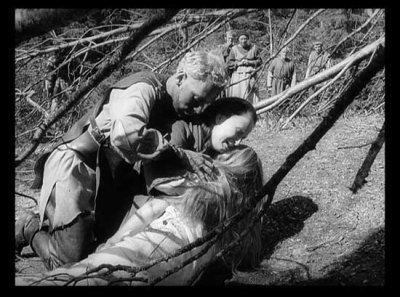
Sound: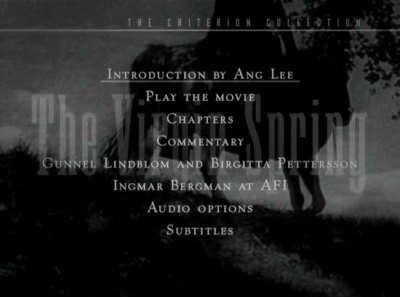
|
| Popular Reviews |
| Sponsored Links |
|
|
| Sponsored Links |
|
|
| Release List | Reviews | Shop | Newsletter | Forum | DVD Giveaways | Blu-Ray | Advertise |
|
Copyright 2024 DVDTalk.com All Rights Reserved. Legal Info, Privacy Policy, Terms of Use,
Manage Preferences,
Your Privacy Choices | |||||||









